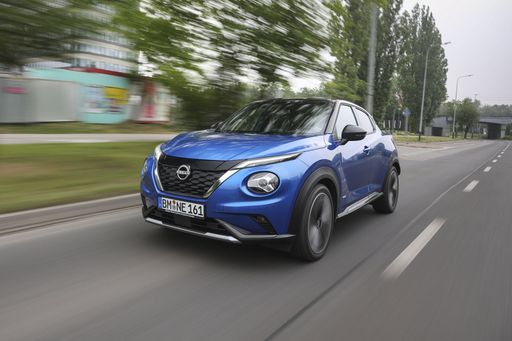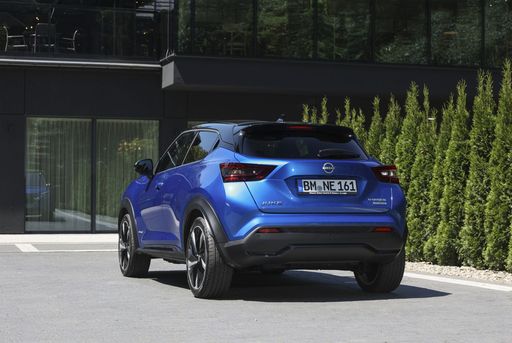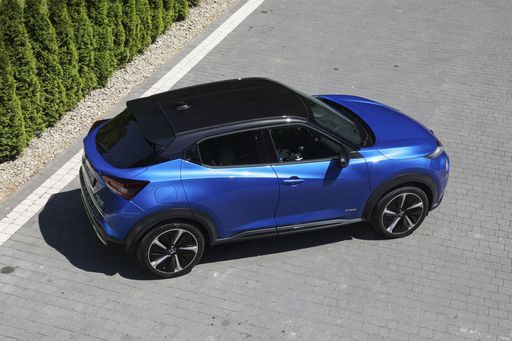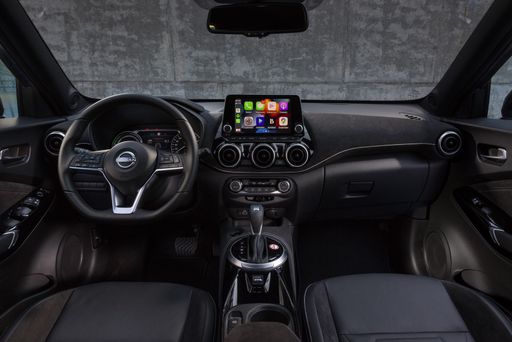Nissan Juke vs Renault Express – Differences & prices compared
Compare performance, boot space, consumption and price in one view.
Find out now: which car is the better choice for you – Nissan Juke or Renault Express?
The Nissan Juke (SUV) comes with a Petrol or Full Hybrid engine and Manuel or Automatic transmission. In comparison, the Renault Express (Cargo Van) features a Diesel or Petrol engine with Manuel transmission.
When it comes to boot capacity, the Nissan Juke offers 422 L, while the Renault Express provides – depending on how much space you need. If you’re looking for more power, decide whether the 143 HP of the Nissan Juke or the 102 HP of the Renault Express suits your needs better.
In terms of consumption, the values are 4.70 L per 100 km for the Nissan Juke, and 4.60 L for the Renault Express.
Price-wise, the Nissan Juke starts at 21400 £, while the Renault Express is available from 17100 £. Compare all the details and find out which model fits your lifestyle best!
Nissan Juke
The Nissan Juke stands out with its distinctive design and bold styling, making it a popular choice for those seeking something different on the road. Its interior cleverly combines modern technology with comfort, offering an enjoyable driving experience for both the driver and passengers. Despite its compact size, the Juke provides a surprising amount of space and versatility, making it suitable for urban adventures and weekend getaways alike.
details @ germany.nissannews.com
@ germany.nissannews.com
 @ germany.nissannews.com
@ germany.nissannews.com
 @ germany.nissannews.com
@ germany.nissannews.com
 @ germany.nissannews.com
@ germany.nissannews.com
Renault Express
The Renault Express brings a fresh design to the van segment, combining practicality with modern styling cues. Its spacious interior and clever storage solutions make it an ideal choice for both business and leisure purposes. With a focus on comfort and functionality, this vehicle stands out as a versatile option for those in need of reliable transportation.
details

|
|
|
|
|
Costs and Consumption |
|
|---|---|
|
Price
21400 - 30100 £
|
Price
17100 - 19500 £
|
|
Consumption L/100km
4.7 - 6 L
|
Consumption L/100km
4.6 - 6.6 L
|
|
Consumption kWh/100km
-
|
Consumption kWh/100km
-
|
|
Electric Range
-
|
Electric Range
-
|
|
Battery Capacity
0.60 kWh
|
Battery Capacity
-
|
|
co2
107 - 136 g/km
|
co2
121 - 149 g/km
|
|
Fuel tank capacity
46 L
|
Fuel tank capacity
50 L
|
Dimensions and Body |
|
|---|---|
|
Body Type
SUV
|
Body Type
Cargo Van
|
|
Seats
5
|
Seats
2
|
|
Doors
5
|
Doors
4
|
|
Curb weight
1274 - 1405 kg
|
Curb weight
1296 - 1390 kg
|
|
Trunk capacity
354 - 422 L
|
Trunk capacity
-
|
|
Length
4210 mm
|
Length
4393 mm
|
|
Width
1800 mm
|
Width
1775 mm
|
|
Height
1593 mm
|
Height
1811 mm
|
|
Payload
405 - 427 kg
|
Payload
575 - 700 kg
|
Engine and Performance |
|
|---|---|
|
Engine Type
Petrol, Full Hybrid
|
Engine Type
Diesel, Petrol
|
|
Transmission
Manuel, Automatic
|
Transmission
Manuel
|
|
Transmission Detail
Manual Gearbox, Dual-Clutch Automatic, Automatic Gearbox
|
Transmission Detail
Manual Gearbox
|
|
Drive Type
Front-Wheel Drive
|
Drive Type
Front-Wheel Drive
|
|
Power HP
114 - 143 HP
|
Power HP
75 - 102 HP
|
|
Acceleration 0-100km/h
10.1 - 11.8 s
|
Acceleration 0-100km/h
11.9 - 16.3 s
|
|
Max Speed
166 - 180 km/h
|
Max Speed
100 - 167 km/h
|
|
Torque
200 Nm
|
Torque
200 - 240 Nm
|
|
Number of Cylinders
3 - 4
|
Number of Cylinders
4
|
|
Power kW
84 - 105 kW
|
Power kW
55 - 75 kW
|
|
Engine capacity
999 - 1598 cm3
|
Engine capacity
1332 - 1461 cm3
|
General |
|
|---|---|
|
Model Year
2024
|
Model Year
2021
|
|
CO2 Efficiency Class
D, E, C
|
CO2 Efficiency Class
D, E
|
|
Brand
Nissan
|
Brand
Renault
|
Nissan Juke
Introduction to the Nissan Juke: A Compact SUV with Style
The Nissan Juke has always been a standout in the compact SUV segment, renowned for its bold design and impressive versatility. As we look at the 2024 model year, Nissan continues to innovate, offering a range of options that cater to both practicality and driving pleasure.
Performance and Efficiency: Under the Bonnet of the Nissan Juke
The 2024 Nissan Juke comes with a variety of engine choices tailored to suit different driving needs. With power outputs ranging from 114 to 143 PS, these engines strike a balance between performance and efficiency. The petrol options are equipped with a 1.0-litre three-cylinder engine that generates 114 PS, providing a sprightly drive perfect for urban environments. Meanwhile, the 1.6-litre hybrid version offers 143 PS, combining electric and petrol power for a more eco-friendly performance.
Fuel consumption varies between 4.7 and 6 L/100km, highlighting the Juke's commitment to efficiency. With CO2 emissions ranging from 107 to 137 g/km, the Nissan Juke offers an environmentally conscious choice for drivers seeking to reduce their carbon footprint.
Driving Technology and Innovation
Innovation is at the heart of the Nissan Juke, with cutting-edge technology designed to enhance the driving experience. The hybrid variants use a unique full-hybrid system, incorporating a small 0.6 kWh battery to provide seamless power assistance during acceleration. This system not only improves efficiency but also supports a smooth, responsive driving experience.
The Juke's manual gearboxes and various automatic transmission options, including the efficient dual-clutch transmission, ensure that drivers can choose the driving style that best suits their preferences. Front-wheel drive remains standard across the range, delivering dependable and predictable handling characteristics.
Design and Comfort: More Than Just Looks
The Juke's exterior is daringly distinctive, with a design that combines angular lines and a high-riding stance to create a sporty yet practical profile. The dimensions of 4,210 mm in length, 1,800 mm in width, and 1,593 mm in height, combined with its 5-door configuration, ensure ample space and accessibility for passengers and luggage alike.
Inside, the Nissan Juke accommodates up to five passengers with comfort and style. A boot capacity ranging from 354 to 422 litres provides adequate space for everyday life or weekend getaways. The various trim levels, including Acenta and Tekna, are equipped with premium features and technology to keep occupants entertained and comfortable.
Safety Features and Driver Assistance
Nissan has equipped the Juke with an array of safety features that provide peace of mind on the road. The Juke includes standard and optional technologies such as adaptive cruise control, lane-keeping assist, and emergency braking systems, enhancing both driver confidence and passenger safety.
With CO2 efficiency classes ranging from C to E, the Nissan Juke not only delivers advanced safety but also meets modern environmental standards.
Conclusion: A Balanced Compact SUV
The 2024 Nissan Juke stands out as a compelling choice in the compact SUV market. With its combination of eye-catching design, innovative technology, and efficient performance, the Juke continues to attract drivers looking for a unique vehicle that doesn’t compromise on practicality or driving pleasure. Whether in the city or on the open road, the Juke delivers a driving experience that is both thrilling and responsible.
Renault Express
Introduction to the Renault Express
The Renault Express, a compact van from the renowned French manufacturer, continues to make a lasting impression in the versatile light commercial vehicle segment. With its practical design and array of engine configurations, it caters to a wide spectrum of business needs, offering both diesel and petrol variants. As we delve into the details, we'll explore the specifications and innovations that set the Renault Express apart from its competitors.
Efficient Powertrains
The Renault Express boasts a diverse range of engines tailored for efficiency and performance. At the core, it features a selection of both diesel and petrol engines, with outputs ranging from 75 PS to 102 PS. This ensures that operators can select a powertrain that precisely matches their performance requirements and budget constraints.
Whether you opt for the BLUE dCi diesel engine or the TCe petrol variant, the Renault Express promises robust performance combined with impressive fuel economy ranging from 4.6 to 6.6 L/100km. The manual transmission and front-wheel drive configuration further contribute to its efficient operation.
Practicality and Usability
Designed with practicality in mind, the Renault Express excels in usability. With a load capacity ranging from 575 to 700 kg, it provides adequate cargo space for business users. Its compact dimensions—measuring 4,393 mm in length, 1,775 mm in width, and 1,811 mm in height—ensure it remains manoeuvrable even in tight urban environments.
The van’s 50 L fuel tank complements its fuel-efficient nature, minimizing the frequency of refuelling stops and enhancing productivity.
Comfortable and Functional Interior
Inside the Renault Express, a no-nonsense cabin offers comfort and functionality across its two-seat configuration. The straightforward yet ergonomic layout is designed for those who spend significant time on the road. Essential features are included to support the driver, ensuring a pleasant experience even during long journeys.
Safety and Innovation
Renault has not compromised on safety with the Express. With modern safety protocols, the van aims to offer peace of mind to its occupants. Although it's built primarily for utility, the inclusion of essential safety features demonstrates Renault’s commitment to protecting its drivers and cargo.
Innovation is further represented through its environmental considerations, such as the CO2 efficiency class spanning D to E, and emissions ranging from 121 to 149 g/km. This conscientious engineering underscores Renault’s efforts towards a more sustainable future.
Final Thoughts
In conclusion, the Renault Express is a testament to Renault's expertise in crafting efficient, reliable light commercial vehicles. Its blend of power, economy, and practicality makes it a competitive choice for businesses seeking a dependable partner on the road. With a starting price point that remains accessible, the Renault Express continues to deliver exceptional value to its customers, making it a standout in the small van category.
Which drive types are available for the Nissan Juke?
Available as .
The prices and data displayed are estimates based on German list prices and may vary by country. This information is not legally binding.
